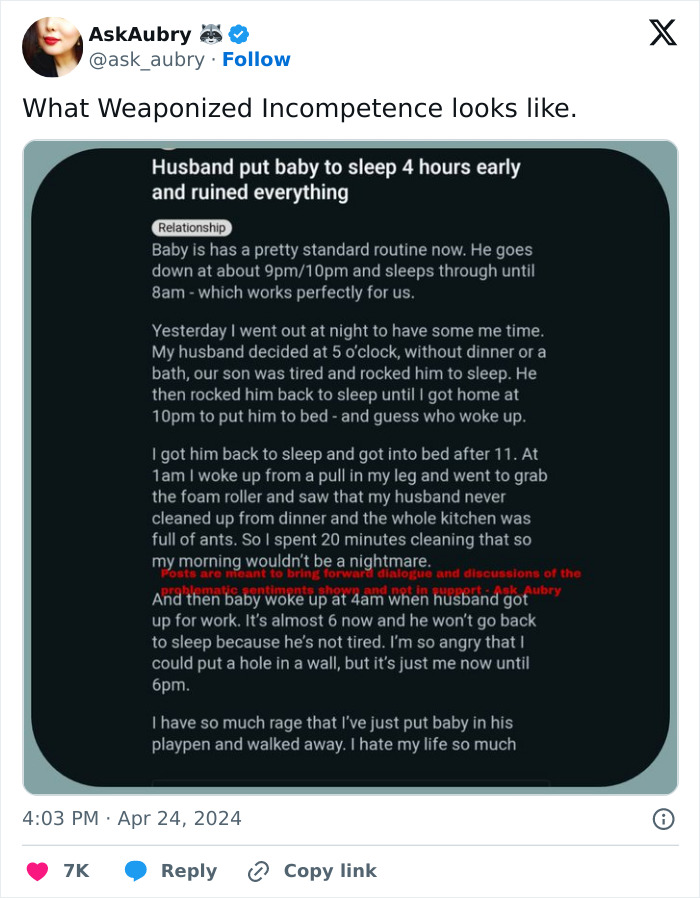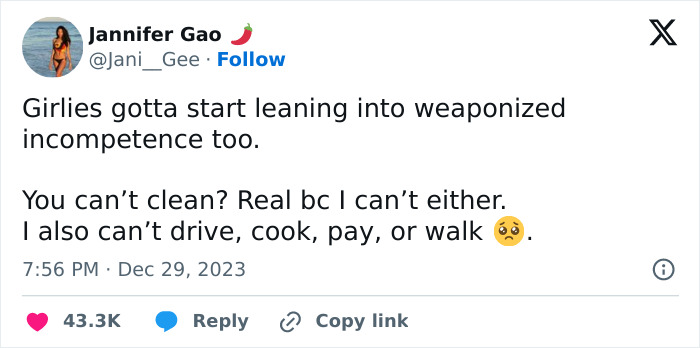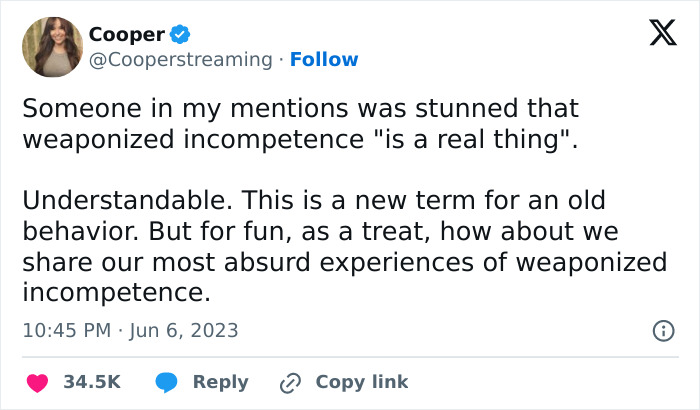While some women have embraced gender stereotypes and taken a liking to the conservative trad wife movement, others have taken a different route, exposing everything wrong with certain societal expectations. One particular behavior embodying problematic gender norms has gained traction on social media: weaponized incompetence.
On TikTok, the term “weaponized incompetence” has nearly 75 million posts as of Wednesday (September 11). In one particular video on the social media platform, educator Laura Danger slammed what appeared to be a prank.
The prank in question consisted of a husband being asked to “wash the potatoes” by his visibly busy wife. The husband subsequently started washing the potatoes with Palmolive dish soap before asking his wife: “That Palmolive soap is good for the potatoes, right?”
Fed up with her husband’s total cluelessness in the kitchen, the wife was filmed taking over the task before the useless husband gave a look of satisfaction to the camera.
An expert spoke to Bored Panda about weaponized incompetence

Image credits: Kaspars Grinvalds/stock.adobe.com
“Weaponized incompetence,” Laura Danger exclaimed. She stated: “Trying to call this comedy is making light of an issue that is serious. There is a stress gap between men and women.”
She continued: “Compared to men, women are twice as likely to suffer from severe stress and anxiety. Married women do more housework than married men.”
In the 2023 Stress in America survey, women reported higher average stress levels than men (5.3 versus 4.8 out of 10). Women were also more likely to rate their stress as more intense (8-10/10) compared to men.

Image credits: ask_aubry
Another married couple took to their TikTok page to exemplify what they thought were the differences between weaponized incompetence and actually “not knowing how to do stuff.”
In that case, the husband in the video humorously illustrated weaponized incompetence by smashing an egg onto a cooking tray before announcing: “You’re so much better at cooking and cleaning than me!
“Why don’t you just do it?”
Weaponized incompetence is a passive-aggressive behavior

Image credits: thatdarnchat
Another example showed the comical man dropping a couple of dirty dishes into a sink filled with water before enthusiastically leaving the kitchen.
On the other hand, the wife went on to display what needing actual help looked like by pretending to struggle with a car’s tire, saying: “Can you help me change this tire? I have never had to do this in my life!”
To which her husband replied: “That makes total sense because I can’t either. Let’s call a mechanic!”

Image credits: Jani__Gee
According to Christina Scott, a professor of Social Psychology at the Department of Psychological Sciences at Whittier College in California, USA, weaponized incompetence is a passive-aggressive behavior where someone will pretend to be unable to successfully complete a task in the hopes that someone else will do it for them.
She explained why women, especially moms married to men, seemed to experience it the most, stating: “Gender roles encourage women to be ‘caretakers,’ and this identity can be amplified when heterosexual married women become mothers.”
Dr. Scott, whose program of research focuses primarily on women’s sexual arousal and behavior, told Bored Panda in an email: “Many women may find it easier to simply complete the necessary task, such as cooking, doing laundry, or making the bed, because it is more efficient and less stressful than standing one’s ground and having a difficult conversation about gender roles.”
It’s when someone pretends to be unable to successfully complete a task
@thatdarnchat I’m not sure where the joke is… #weaponizedincompentence ♬ original sound – Laura Danger

Image credits: djile/stock.adobe.com
She explained what signs a person should look for within their relationship to understand that they may be experiencing weaponized incompetence.
“Consider the division of labor in the relationship,” Dr. Scott said. “Are you and your partner comfortable with your respective ‘chores?’ Are there any concerns about gender roles and how they may have played a role in the tasks you each chose?”
She continued: “A critical consideration is whether either partner ‘resents’ the chores they are undertaking, and if so, an open and honest conversation is absolutely warranted.”
The person will then hope that someone else will do it for them

Image credits: OhNayaPapaya
@dvnielbon #comedy #joke #funny #men #women #relationships #weaponisedincompetence ♬ original sound – Daniel BonaconsaDr. Scott went on to touch on the concept of mental load, explaining: “Mental load involves the emotional and cognitive effort needed to manage all of one’s responsibilities in life, including work, family, and relationships.
“When we feel mentally overloaded, it may feel easier to minimize our capabilities and try to offload responsibilities onto someone else, but this can definitely lead to weaponized incompetence, even if it is unintentional.
“Mental load, burnout, and resentment can quickly become toxic in a relationship if left unchecked, and it is essential that partners sit down and communicate openly with each other about their feelings so they can find a mutually agreeable solution together.”
Women have been calling out weaponized incompetence on Tiktok

Image credits: thisfamilytree
According to a 2019 survey conducted by P&G in Spain, three in every four women bear the burden of mental load.
Furthermore, 63% of mothers claim to have an infinite mental to-do list, compared to 25% of fathers.
87% of mothers are primarily responsible for everything running smoothly at home, and 69% say their partners chip in, but only when asked to.

Image credits: Cooperstreaming
Another study, published in the American Sociological Review in 2019, identified four clear stages of mental work that fall directly on women: anticipating needs, identifying options, deciding among the options, and monitoring the results.
“Initially, the feeling of being ‘needed’ or ‘superior’ at certain tasks might be uplifting, but as more and more chores are undertaken, and the division of labor becomes more uneven, feelings of resentment and burnout are likely to quickly follow,” Dr. Scott revealed.
When asked if she considered weaponized incompetence a form of abuse, Dr. Scott replied: “Without question, repeated instances of weaponized incompetence will put an increasingly heavier burden on one partner, which is a form of abuse, even if unintentional.”
Women, especially moms married to men, seem to experience it the most
@thisfamilytree have you ever experienced weaponized incompetence? #momsoftiktok #parentsoftiktok #weaponizedincompetence #comedy #marriedcouple #couplecomedy #couple ♬ Married Life (From “Up”) – Geek MusicThe mental health expert shared: “In psychology, we often discuss ‘social loafing,’ which is the perception that you can put forth less effort when you are a part of a group, either because others know more than you do or that your input will not be as valuable.
“I wonder if this is the more ‘unintentional’ form of weaponized incompetence.
“I remember my father doing a horrible job of making the bed each morning and my mother finally giving up and doing it herself.

Image credits: Drazen Zigic/freepik
“I wonder whether this was 1) intentional weaponized incompetence, 2) social loafing, or 3) a need within him to be ‘taken care of’ that he didn’t express verbally.
“I don’t think we will ever know, but communication and openness between individuals will always be essential.”
Dr. Scott finally advised: “Communication is essential on both sides! Set aside uninterrupted time with your partner to discuss the division of labor and identify how stress may be affecting both partners.
Women reported higher average stress levels than men
@miamariahcontee Weaponized incompetence adds to the mental load & doesn’t allow us a mental break when we are still managing the tasks. #MentalLoad #LaborDistribution #Marriage #WeaponizedIncompetence #Partnerhship #SheFaultParent #DefaultParent || sound cred: @Zach Recovering Manchild ♬ original sound – Zach Recovering Manchild“Be honest and direct with your concerns and consider solutions that will reduce the amount of chores.
“Perhaps hiring extra help or alternating responsibilities may be worth considering.
“Above all, being open and direct with your feelings and concerns is critical in all aspects of a relationship.”
“It’s honestly very depressing,” a person commented

























 English (US) ·
English (US) ·